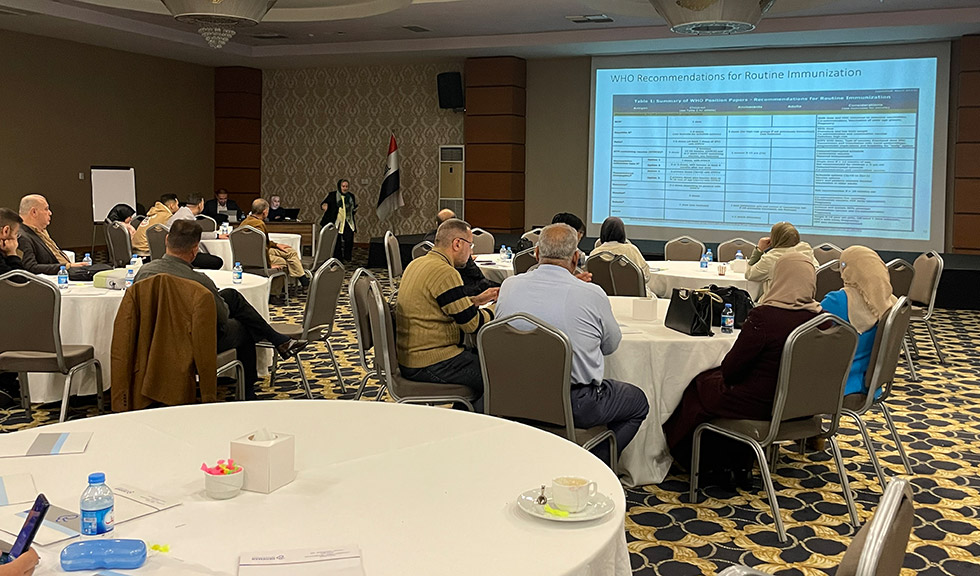 WHO and Iraqi health authorities concluded a collaborative EPI bottleneck analysis workshop to enhance immunization in Iraq. Photo credit: WHO/WHO Iraq
WHO and Iraqi health authorities concluded a collaborative EPI bottleneck analysis workshop to enhance immunization in Iraq. Photo credit: WHO/WHO Iraq
19 December 2023, Erbil, Iraq – Iraq has seen routine immunization coverage fluctuate in 2023, and there has also been a very low uptake of COVID-19 vaccination. To assess the immunization landscape in Iraq, the WHO Country Office in Iraq ran a 4-day Expanded Programme on Immunization (EPI) bottleneck analysis workshop.
The workshop sought to explore how well immunization targets had been achieved at various administrative levels, from service points to central level. The event was organized in partnership with the federal Ministry of Health and the Ministry of Health in the Kurdistan region of Iraq and in collaboration with EPI partners.
Some of Iraq’s provinces and districts have reached – and even exceeded – the EPI targets. Indeed, Iraq was among the first 9 countries globally to successfully attain one of the targets of the Immunization Agenda 2030. But other areas have shown suboptimal coverage, falling below the threshold needed to protect children from vaccine-preventable diseases. This leaves a large number of children at risk of potentially fatal diseases.
It is worth noting, however, that current efforts must go beyond the usual routine immunization for children to also encompass COVID-19 vaccination for all ages.
The main aim of the workshop was to chart a road map to identify such disparities across the country and put forward solutions, including the resources required and responsible parties. It is crucial to both understand how to achieve the best vaccination coverage at the level of the lowest administrative unit and also take swift and effective action. When it comes to addressing the threat of vaccine-preventable diseases, no child should be left behind.
WHO spearheads this initiative and is committed to using every available resource to overcome challenges and seize opportunities in this area. Using the workshop’s analysis of the current immunization landscape, the goal is to now implement concrete strategies to boost vaccination coverage and disease prevention across Iraq.
“We acknowledge the challenges inherent in the EPI area, but we are optimistic about the opportunities that lie ahead,” said Dr Wael Hatahit, Acting WHO Representative in Iraq. “It is vital to harness the potential of existing resources, including skills and tools, to efficiently address these challenges and prevent morbidity and mortality from vaccine-preventable diseases among children in Iraq.”
Dr Firas Al Khafaji, WHO EPI-Polio Officer, added: “The workshop’s intentional inclusion of the term ‘EPI bottleneck’ emphasizes that it goes beyond routine vaccinations for children. It covers a broader perspective, including the critical aspect of COVID-19 vaccination. This holistic approach aims to tackle all aspects of immunization to create a robust and resilient health system that safeguards the health of Iraq’s children.”
For more information, please contact:
Ajyal Sultany
WHO Iraq Communications Officer
+9647740892878
This e-mail address is being protected from spambots. You need JavaScript enabled to view it




